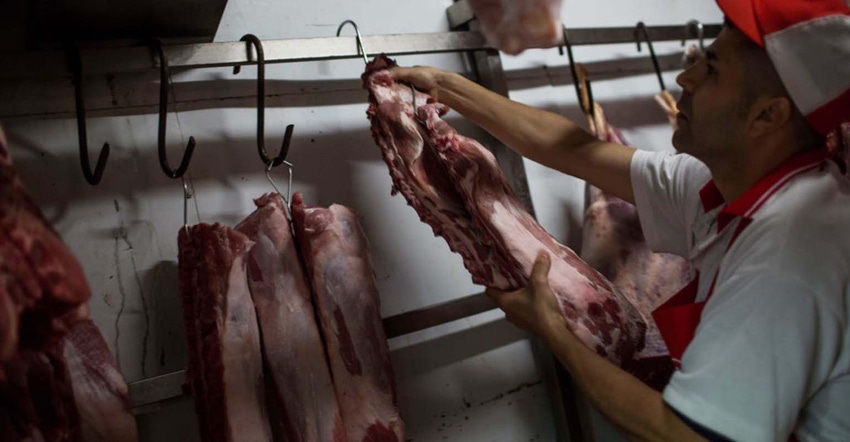
by Gerson Freitas Jr.
By taking their father’s slaughterhouse in the Brazilian countryside and building the world’s largest meat producer, Wesley and Joesley Batista earned reputations as consummate dealmakers. Their latest bargain, which may be their boldest yet, has dragged the country and its president into a crisis.
The brothers, who control and run meat giant JBS SA, are among seven company executives who signed a plea bargain agreement with Brazilian authorities in exchange for reduced sentences, according to a person with direct knowledge of the matter, who asked not to be identified. The accord related to investigations into transactions between JBS, the Batistas’ holding company, and state-run banks and pensions funds, the person said.
As part of that agreement, the brothers submitted to the Supreme Court a recording that shows President Michel Temer approving a payment to Eduardo Cunha, the mastermind behind last year’s impeachment of former president Dilma Rousseff, according to O Globo newspaper. In return, the Batistas agreed to pay 225 million reais ($67 million) in fines, and will face no trial, O Globo reported.
The real and Brazilian stock prices plunged early Thursday as Temer denied wrongdoing. JBS fell as much as 20% in Sao Paulo. The company and its parent, J&F Investimentos SA, declined to comment on the plea bargain.
If nothing else, the revelations illustrate how deeply embedded the Batistas are in both the country’s business and political life. JBS and other companies under the J&F umbrella have financed almost a third of representatives in Brazil’s chamber of representatives. They doled out a record 387 million reais in donations in the 2014 elections, according to Brazil’s electoral tribunal. JBS was the biggest campaign donor that year for the re-election of Dilma Rousseff, as well as for the loser in the presidential race, Aecio Neves.
More recently, JBS has struggled amid several investigations. They include a probe known in Brazil as Weak Flesh, which concerns allegations that meat producers including JBS were accused this year by the police of paying bribes to federal inspectors to clear the sale of tainted meat. JBS has denied any wrongdoing.
JBS shares touched 7.63 reais in Sao Paulo trading, the lowest intraday price since July 2014. The company’s $750 million in notes due in 2024 lost 2.3% to 100.31 cents, the biggest decline since October.
Separately, transactions between JBS and state-bank BNDES have been investigated by Brazil’s federal audit court for more than a year. Prosecutors are looking for evidence of fraud and irregularities, such as overpricing and noncompliance, according to a court filing. The transactions in question led to about 1.2 billion reais of losses at the bank, the police said last week.
Headquarters Searched
Joesley, 45, who is JBS’s chairman, was last month ordered by a federal court judge to step down as chairman of J&F and of the family’s pulp company Eldorado Brasil Celulose SA. Last year, Joesley and Wesley -- JBS’s 47-year-old chief executive officer -- briefly stepped down at the meat company following a court order connected to a probe into pension-fund fraud. The building in Sao Paulo that serves as the headquarters for JBS and J&F has been searched by police on two separate occasions.
Despite the whiff of scandal, JBS has been a Brazilian success story. Revenues have risen sevenfold since 2007, when it started trading publicly. It became the world’s largest meat producer after spending more than $20 billion on a string of acquisitions, including U.S. company Swift & Co., Smithfield Foods Inc.’s beef unit and poultry supplier Pilgrim’s Pride Corp.
Part of that decade-long spree was financed by BNDES, which injected about 8 billion reais into JBS as part of a broader plan to stimulate the creation of Brazilian multinationals.
The five Batista siblings -- Joesley, Wesley, Valere, Vanessa and Vivianne -- have an equal interest in J&F, the holding company, through which they and other family members control JBS, as well as investments in banking, pulp, cattle, cleaning products and construction. A sixth sibling, Jose Batista Jr., sold his position in the business.
Their father, Jose Batista Sobrinho, 84, started the family food empire in the 1950s, as President Juscelino Kubitscheck implemented his “five years in fifty” plan to fast-track construction in Brasilia, the nation’s new capital. Jose, who started out by butchering five head of cattle a day, helped supply meat for the city’s construction workers. He made his first acquisition, a meatpacking plant in Planaltina, in 1968, before setting his sights outside Brazil.
To contact the reporter on this story: Gerson Freitas Jr. in São Paulo at [email protected]
To contact the editors responsible for this story: Simon Casey at [email protected]
Millie Munshi
© 2017 Bloomberg L.P
About the Author(s)
You May Also Like




